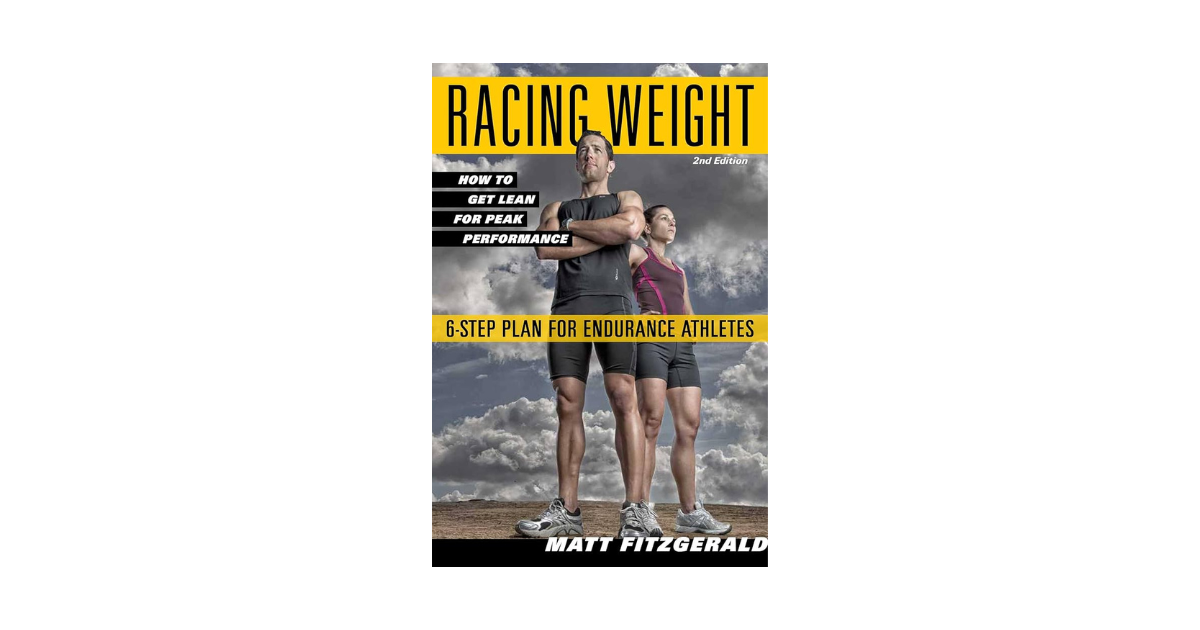Racing Weight: How to Get Lean for Peak Performance
This intriguing book on optimal weight by Matt Fitzgerald is a practical and insightful guide tailored specifically to athletes who want to achieve their optimal performance weight. Fitzgerald, a well-respected sports nutritionist and endurance athlete, delves into the concept of “racing weight”—the optimal weight that maximises performance without sacrificing health or energy. This book addresses a common pitfall for many athletes who, despite their training, often compete at weights above their peak performance level.

6-STEP PLAN FOR ENDURANCE ATHLETES
Fitzgerald breaks down his advice into a manageable framework of six steps. These include:
- This is Fitzgerald’s Racing Weight plan. It is aimed at improving your diet quality using the a simplistic ‘Diet Quality Score’ . The focus is on increasing the amount of nutrients you get from each calorie, thus getting all the nutrients you need for maximum performance from fewer total calories.
- Managing your appetite which delves into the psychology of why we overeat and highlights eight effective ways of managing appetite so that you do not overeat or go hungry.
- Balancing your energy sources which discusses the main sources of energy, carbohydrate, fat, and protein (macro nutrient ratios) and how the endurance athlete can obtain the right amount of carbohydrates for training performance.
- Monitoring yourself through measuring metrics and self-monitoring. Matt Fitzgerald discusses different fitness tests for various sports to correlate the positive effect of a lower racing weight and performance.
- Timing of nutrients highlighting eating earlier in the day. He discusses the practice of eating the right nutrients at the right time of day to maximise lean muscle and reduce fat tissue.
- Training right for a racing weight including high volume, strength and interval training. Matt Fitzgerald looks at the common training mistakes made by endurance athletes which inhibit improvement in performance and body composition.
All of these steps are designed to help athletes reach their racing weight in a sustainable way. He acknowledges that many athletes mistakenly view weight loss as simply a numbers game and thus end up sacrificing their performance and energy levels. Instead, he advocates for a more nuanced approach that considers the unique nutritional and energy needs of athletes in various disciplines, from runners and cyclists to triathletes and rowers.
A key strength of *Racing Weight* is its realistic, data-driven approach. Fitzgerald encourages athletes to understand their unique body composition rather than chase arbitrary numbers on the scale. He provides practical tools like body composition calculators, food-quality scoring systems, and sample meal plans, helping readers translate theory into actionable steps. One especially valuable section focuses on the distinction between fat loss and muscle maintenance, a crucial area for athletes who must balance weight with strength and endurance.
There is also a very interesting chapter on “What The Pros Eat“. This is a great insight into the diet and training of world class athletes.
The book sheds light on the psychological aspects of reaching and maintaining racing weight, addressing how athletes can set realistic goals and avoid the common traps of under-eating or obsessing over restrictive diets. Fitzgerald’s tone is supportive and pragmatic, which makes his advice feel accessible even to those who may have struggled with weight or body image in the past.

The conclusion of *Racing Weight* by Matt Fitzgerald is that it reinforces the importance of aligning one’s weight and nutrition with performance goals. Fitzgerald wraps up by emphasising that racing weight is not just about hitting a particular number on the scale; it’s about reaching a state where your body can perform at its best. He stresses that the six-step plan isn’t a short-term fix but a long-term approach that encourages a healthy relationship with food, prioritising energy and performance over extreme diets or quick weight loss. By following his plan, athletes are more likely to reach their peak performance weight in a sustainable and healthy way.
My personal experience of shedding 7kgs by following the six-step plan speaks to the effectiveness of his methods. By using the tools he provides, such as focusing on food quality, portion control, and mindful eating, you managed to lose weight without sacrificing strength or energy. The six-step approach guides you to assess your food choices more critically, keep your training fuelled, and measure progress in a way that made sense for you as an athlete. This achievement not only brings you closer to your optimal racing weight but also highlights the balance and sustainability that Fitzgerald advocates.
Ultimately, Fitzgerald’s conclusion is that racing weight is a journey unique to each athlete. His message resonates strongly with athletes who understand that reaching peak performance is more than a quick weight-loss goal; it’s a commitment to one’s health, energy, and long-term athletic potential. My experience is a testament to the book’s value in helping athletes achieve their best selves in a structured, realistic, and rewarding way.
Overall, *Racing Weight* is both an excellent guide and a manual for athletes looking to refine their approach to nutrition and body composition in pursuit of peak performance. By focusing on sustainable and scientifically-backed strategies, Fitzgerald offers a pathway for athletes to reach their optimal racing weight without compromising their health, energy, or love for their sport. This book is a valuable resource for both amateur and professional athletes committed to reaching their best physical form and sustaining it throughout their athletic career.




